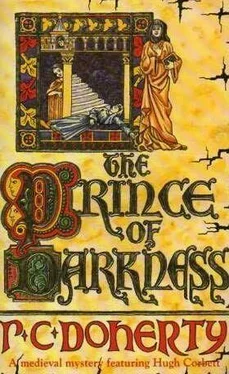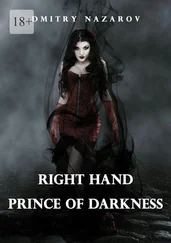Paul Doherty - Prince of Darkness
Здесь есть возможность читать онлайн «Paul Doherty - Prince of Darkness» весь текст электронной книги совершенно бесплатно (целиком полную версию без сокращений). В некоторых случаях можно слушать аудио, скачать через торрент в формате fb2 и присутствует краткое содержание. Жанр: Исторический детектив, на английском языке. Описание произведения, (предисловие) а так же отзывы посетителей доступны на портале библиотеки ЛибКат.
- Название:Prince of Darkness
- Автор:
- Жанр:
- Год:неизвестен
- ISBN:нет данных
- Рейтинг книги:5 / 5. Голосов: 1
-
Избранное:Добавить в избранное
- Отзывы:
-
Ваша оценка:
- 100
- 1
- 2
- 3
- 4
- 5
Prince of Darkness: краткое содержание, описание и аннотация
Предлагаем к чтению аннотацию, описание, краткое содержание или предисловие (зависит от того, что написал сам автор книги «Prince of Darkness»). Если вы не нашли необходимую информацию о книге — напишите в комментариях, мы постараемся отыскать её.
Prince of Darkness — читать онлайн бесплатно полную книгу (весь текст) целиком
Ниже представлен текст книги, разбитый по страницам. Система сохранения места последней прочитанной страницы, позволяет с удобством читать онлайн бесплатно книгу «Prince of Darkness», без необходимости каждый раз заново искать на чём Вы остановились. Поставьте закладку, и сможете в любой момент перейти на страницу, на которой закончили чтение.
Интервал:
Закладка:
'Ranulf!' he murmured.
'Yes, Master?'
'Somehow, please return the silver figurines to the Lady Prioress!' 'Yes, Master.'
The next morning Corbett rose early, woken by the tolling of the priory bell. He washed, cleansing his face and hands in a deep brass bowl placed in the wooden lavarium, dressed and roused Ranulf for early morning Mass. The air was heavy with mist as Corbett made his way towards a small farm within the priory grounds. He heard the gulping noise of greedy sows; a peasant called to his sons across the dawn-dark grass to put away their mattocks and hoes and prepare for Mass. One of the nuns, her face pale as cheese and heavy with sleep, was talking to one of the lay sisters who was yoked with clanking buckets, returning from milking the cows. Another lay sister, her gown rucked up, sleeves pushed high above her elbows displaying lean, brown, muscular arms, was walking slowly up from the well, a brimming bucket in either hand; beside her a barefooted, dusty girl drove a flock of hissing geese back into their pens.
Corbett walked right round, through the now open Galilee Gate and on the dry, dusty track which wound past the priory. He took a deep breath, enjoying the sweet-scented smells. In the woods across the track, dew still dripped from the branches; cuckoos, wood pigeons and thrushes sang their morning chorus in the deep green darkness. The priory bell tolled again, calling him back from the part of the day he loved most. The clerk drew deep breaths, sucking in the fresh morning air. A beautiful morning which brought memories of Leighton Manor and other older images flooding back into his mind. He closed his eyes, revelling in the peace as he braced himself against the troubles of the day: he must remember that the calm serenity of Godstowe hid murky, murderous secrets which threatened the crown itself.
Corbett opened his eyes, fingered the stubble on his chin, and promising himself he would shave as soon as possible, went back to collect a sleepy-eyed Ranulf.
If the priory was luxurious, the church would have done justice to any great earl or nobleman. The walls were covered by a brilliantly coloured painting of Christ harrowing Hell, freeing souls from the grip of black-faced demons who looked all the more horrible for their scarlet bodies covered in dark blotches of fur. The church was divided by a heavy wooden chancel screen, every inch of it covered with the most intricate carvings of angels, saints, and scenes from the Old and New Testaments. As they went through it into the sanctuary, the Lady Prioress swept majestically as a bishop towards her stall, indicating the bench where they should sit. Corbett bowed, muttering at Ranulf to hush his mumbled observations about the arrogance of some women.
The clerk sat and looked around: on either side of the chancery were the nuns' stalls, each with their own carved oak recess with bench and prie dieu. Beyond these the altar rail and the marble white purity of the sanctuary: the great ivory-coloured altar now covered in costly clothes, with pure beeswax candles fixed in heavy silver holders standing on either side. The sunlight pouring through the small rose window made the precious cups and chalices placed there glitter and shimmer with an almost blinding light. Corbett heard a sound and turned, looking round the chancel screen The peasants from the nunnery farm were now filing in. According to custom they would not be allowed any further than the nave, so they squatted in their dusty green, brown or russet smocks upon the flagstoned floor.
Corbett studied them, travelling back in time, as if they were ghosts from his own past His father and mother had once sat like that no more than peasants and so, by King's law and divine decree, not worthy to sit beyond the chancel screen Instead they could look at the priest from afar, listen to his sermon, and study the paintings put there for their spiritual improvement
A bell tinkled and Father Reynard, dressed in fiery red and gold vestments, swept out of the sacristy and up to the altar. He stood at the foot of the steps, making the sign of the cross, his great voice intoning the introductory psalm:
I will go unto the altar of God, to God who gives glory to my youth!'
Corbett studied the nuns on either side, watching each face intently. In the main they were fat, well fed and smug, Dame Elizabeth being a notable exception in her austerity. Lady Amelia in her silk habit and lace-edged wimple, gazed round with all the hauteur of a noblewoman; Dame Agatha's face looked serene and composed in prayer, though Corbett watched her dark sloe eyes glance quickly across at him. He caught the hint of mischief in her face. Now Father Reynard had gone up the altar steps, standing beneath the blue and gold canopy which swung on velvet cords from the costly hammerbeam roof. The spiritual magic was being worked, Christ called down under the likeness of bread and wine, but Corbett stirred at the end of the Mass as Father Reynard mounted the wooden pulpit to give the sermon, his hands resting on the great eagle with its carved, outstretched wings.
'Woe to you!' the Franciscan began. 'You rich and pampered ones who ignore the needy, the poor folk, prisoners in dungeons created by your wealth. What they scrimp by spinning, they pay out to you in rents and times so they have only watered porridge to satisfy their young ones who groan aloud for food.' He drew back the sleeves of his gown, exposing his strong brown wrists. Eyes half-closed, he rocked to and fro. 'Woe to you rich, you pampered ones who ignore the peasants, too ashamed to beg, who wake at night to rock the cradle, to patch and wash!'
Corbett looked along the line of nuns. Even the most somnolent had now stirred themselves.
'Woe to you, the pampered ones with your secret lusts, who do not revere the Madonna but pine after the secret mysteries of Queen Mab and the harlotries offered by hobgoblins, be they human or demoniac. Can you not read the signs? Satan walks and has already made his mark!'
Corbett now sat up, seeing the fury in Lady Amelia's face so apparent, he thought the Lady Prioress would rise and walk out of the church whilst Father Reynard's litany of woes only grew stronger. The priest's eyes now gleamed with fanaticism; his tongue lashed the rich, a veil for his warnings against the Priory of Godstowe. Behind him Corbett heard the peasants stir and murmur their approval. Ranulf was openly grinning. A self-confessed sinner from the gutters of Southwark, he had one virtue: he was totally devoid of hypocrisy. Corbett hoped the sermon would benefit him as well, something to take back to London with him.
At last Father Reynard finished, gave his final benediction and swept into the sanctuary. Lady Amelia rose, genuflected before the altar step and led her sisters out, their hauteur and arrogance now dimmed. None dared raise her eyes as they filed down the nave. Only Dame Agatha, with an impish wink to Ranulf, indicated her approval of what the Franciscan had said Corbett remained seated. The friar's words had affected him also. Was he, so eager for royal justice, ready to show the same to his tenants or had he forgotten his own roots? He remembered the words of his old comrade, de Couville, who now worked in the royal records office at Westminster.
'What does it profit a man, Hugh,' his aged mentor had cackled, 'if a clerk pleases his King but loses his soul?'
Corbett smiled and shifted on the bench. So far his King would hardly be pleased with him. The clerk's sharp, suspicious mind probed at what lay underneath Father Reynard's sermon. Did the Franciscan believe Lady Eleanor had been struck down by God? If so, was Reynard the type of man whp passionately believed that Divine Justice should be given a helping hand? He thought of the friar's strong hands and wrists. If Lady Eleanor had been murdered, her neck expertly broken and the body dumped at the bottom of those stairs, a man like Father Reynard was well suited to be her assassin.
Читать дальшеИнтервал:
Закладка:
Похожие книги на «Prince of Darkness»
Представляем Вашему вниманию похожие книги на «Prince of Darkness» списком для выбора. Мы отобрали схожую по названию и смыслу литературу в надежде предоставить читателям больше вариантов отыскать новые, интересные, ещё непрочитанные произведения.
Обсуждение, отзывы о книге «Prince of Darkness» и просто собственные мнения читателей. Оставьте ваши комментарии, напишите, что Вы думаете о произведении, его смысле или главных героях. Укажите что конкретно понравилось, а что нет, и почему Вы так считаете.












